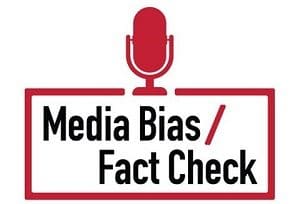LEFT-CENTER BIAS
These media sources have a slight to moderate liberal bias. They often publish factual information that utilizes loaded words (wording that attempts to influence an audience by appeals to emotion or stereotypes) to favor liberal causes. These sources are generally trustworthy for information but may require further investigation. See all Left-Center sources.
- Overall, we rate CBC as Left-Center Biased based on editorial positions that lean slightly left and High for factual reporting due to proper sourcing and a clean fact-check record.
Detailed Record
Bias Rating: LEFT-CENTER
Factual Reporting: HIGH
Country: Canada
MBFC’s Country Freedom Rating: EXCELLENT
Media Type: TV Station
Traffic/Popularity: High Traffic
MBFC Credibility Rating: HIGH CREDIBILITY
History
Founded in 1936 by an Act of Parliament, Canada’s public broadcaster, CBC, is a division of the Canadian Broadcasting Corporation, which replaced the Canadian Radio Broadcasting Commission. CBC presents news, talk, music, and entertainment programs in English, French, and Aboriginal languages. The CBC is based in Toronto, Ontario, Canada.
In 2009, CBC’s Television News, Radio News, and Digital News departments merged with CBC News. Michael Goldbloom is the chairman, and Catherine Tait is the President and Chief Executive Officer of Canadian Broadcasting Corp.
Read our profile on the Canadian government’s influence on media.
Funded by / Ownership
The CBC Board previously consisted of 12 members, all appointed by the Prime Minister of Canada. For example, former conservative prime minister Stephen Harper was accused of appointing the board with members that were also conservative donors. In 2016, Brian Mitchell (who was appointed to the CBC board by then prime minister Stephen Harper in 2008) resigned to seek the Conservative Party of Canada’s presidency. However, recently this structure has changed, and now the non-partisan Independent Advisory Committee makes “merit-based” appointments. According to a Globe and Mail article, “A government source said the board would comprise nine ‘experts in broadcasting and digital technology, representatives of cultural sectors from across Canada,’ as well as ‘Indigenous peoples, official-language communities and youth,’ who will be charged with compiling a list of candidates whose names will be submitted to the government.”
The CBC’s primary revenue comes from government funding (66%); other sources of income include advertising revenue (18%), subscriber fees (8%), and other sources. You can also view CBC Business Model details Here.
Analysis / Bias
In review, when it comes to world news, CBC re-publishes stories from credible sources such as the Associated Press and Reuters: “U.S. stock markets flirt with end of historic rise” and “Indonesian rescuers struggle against heavy rain to reach tsunami-hit villages.”
CBC reports Canadian national news with neutral headlines such as: “The 5 most dramatic moments of the year in Ontario politics”. When it comes to sourcing, the CBC typically sources other CBC articles. This is acceptable as CBC produces and reports its national news.
CBC’s straight news reporting is consistently low-biased, factual, and covers both sides of issues. Editorially, the opinion pages tend to be balanced with some stories leaning left, such as this: Doug Ford’s ‘efficiencies’ seem to be costing taxpayers an awful lot of money: Robyn Urback and right-leaning: Why low-income earners should actually welcome Ontario’s reversal on rent control. Opinion pieces have also been critical of liberal Prime Minister Justin Trudeau. On the whole, slightly more opinion pieces favor the left. Further, the right-leaning National Post has accused the CBC of liberal bias. Finally, a Reuters Institute survey found that 68% of respondents trust their news coverage and 14% do not, ranking them #4 in trust among the major English-language Canadian news providers.
During the Canadian Trucker protest in 2022, CBC anchor Nil Koksal opined that Russia might be instigating or fueling the protest. This unproven claim was clarified by the CBC, stating the claim “should have referenced experts.’
Failed Fact Checks
- None in the Last 5 years
Overall, we rate CBC as Left-Center Biased based on editorial positions that lean slightly left and High for factual reporting due to proper sourcing and a clean fact-check record. ( 7/27/2016) Updated (M. Huitsing 12/31/2023)
Source: https://www.cbc.ca/news
Last Updated on December 31, 2023 by Media Bias Fact Check
Do you appreciate our work? Please consider one of the following ways to sustain us.
or
Left vs. Right Bias: How we rate the bias of media sources


